Volkswagen Group Bundle
What Drives Volkswagen Group's Future?
Explore the core principles steering one of the world's largest automotive manufacturers. Understanding the Volkswagen Group SWOT Analysis is essential, but first, delve into the foundational elements that shape its strategic direction.
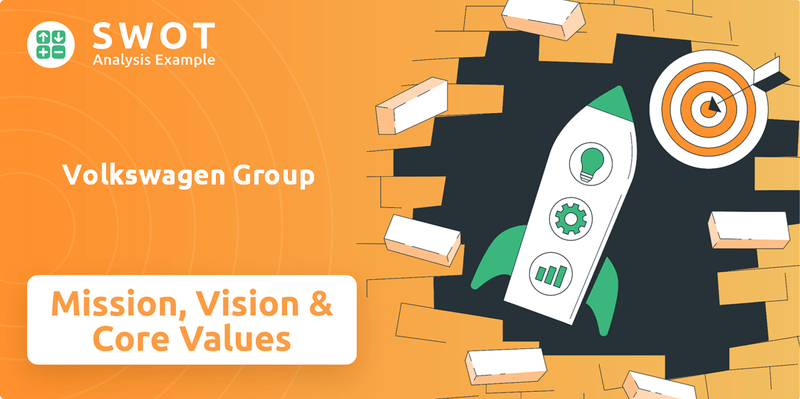
The Volkswagen mission, Volkswagen vision, and Volkswagen core values are more than just corporate statements; they are the cornerstones of the company's identity and strategic approach. These elements are crucial for understanding the Volkswagen Group's commitment to innovation, sustainability, and its long-term goals. Discover how VW company values influence every aspect of the business, from product development to its Volkswagen strategy.
Key Takeaways
- Volkswagen's mission, vision, and values are fundamental to its strategy in the evolving auto industry.
- The vision to be 'The Global Automotive Tech Driver' by 2035 highlights Volkswagen's future goals.
- Group Essentials guide employee conduct and business practices, forming an ethical foundation.
- Investments in EVs and sustainability show alignment between principles and strategic actions.
- A strong purpose, driven by mission, vision, and values, is crucial for success.
Mission: What is Volkswagen Group Mission Statement?
Volkswagen Group’s mission is 'to offer attractive, safe, and environmentally sound vehicles which can compete in an increasingly tough market and set world standards in their respective class.'
Let's delve into the essence of the Volkswagen Group mission statement and what it signifies for the automotive giant.
The Volkswagen mission is a clear declaration of intent, focusing on key aspects of its business. It emphasizes providing vehicles that are not only desirable but also prioritize safety and environmental responsibility. This mission guides the company's strategic direction.
The mission statement is fundamentally customer-centric. It aims to deliver vehicles that meet the evolving needs of consumers, emphasizing attractiveness and safety. This approach ensures customer satisfaction and brand loyalty.
Environmental soundness is a core element of the Volkswagen mission. The company is investing heavily in electric mobility and sustainable production methods. This commitment reflects a broader industry trend toward eco-friendly practices.
Volkswagen aims to compete globally and set world standards. This ambition drives the company to innovate and maintain high-quality products. The goal is to be a leader in the automotive industry.
Volkswagen's mission is reflected in its strategic investments. The company is heavily investing in electric vehicles (EVs) and sustainable manufacturing processes. These investments show a commitment to the mission.
The mission also includes offering mobility for everyone, bridging the gap between advanced technology and affordability. Volkswagen plans to introduce affordable EVs priced under 25,000 euros by the end of 2025, making e-mobility more accessible.
The Volkswagen mission statement encapsulates the company's dedication to providing high-quality, safe, and environmentally responsible vehicles. This Volkswagen mission drives the company's strategic decisions, from product development to market positioning. The company's focus on electric mobility and sustainable production, as evidenced by delivering 771,100 all-electric vehicles in 2023, a 34.7% year-on-year increase, and its aim to introduce affordable EVs by 2025, demonstrates its commitment to this Volkswagen mission. This commitment to innovation and sustainability is a key aspect of the Volkswagen Group's approach, ensuring it remains competitive in the global market. The Volkswagen vision is clearly aligned with the company's actions, emphasizing its dedication to a sustainable future. The VW company values are reflected in its mission, which is to offer attractive, safe, and environmentally sound vehicles.
Volkswagen Group SWOT Analysis
- Complete SWOT Breakdown
- Fully Customizable
- Editable in Excel & Word
- Professional Formatting
- Investor-Ready Format
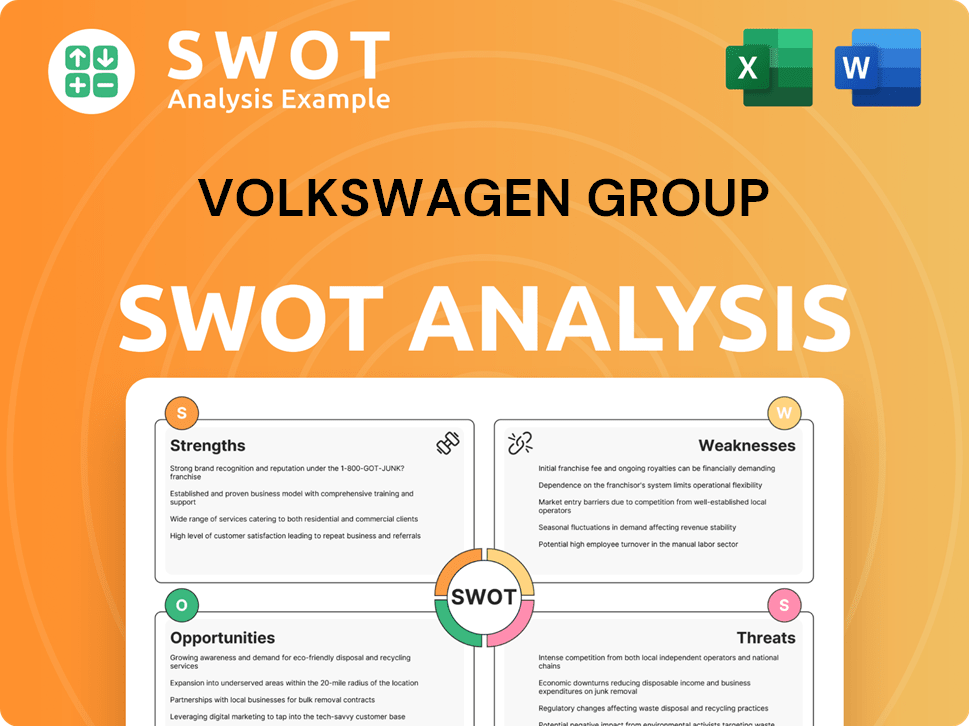
Vision: What is Volkswagen Group Vision Statement?
Volkswagen Group's vision is to be 'The Global Automotive Tech Driver' by 2035, shaping mobility for people now and in the future.
The Volkswagen vision is a bold declaration of intent, signaling a significant shift in the company's strategic direction. It's a future-focused ambition, aiming to position the Volkswagen Group as a leading technological force within the automotive industry. This vision is not merely about selling cars; it's about driving innovation in electric vehicles (EVs), software development, and autonomous driving technologies. The company's commitment to this vision is evident in its substantial investments and strategic initiatives.
The core of the Volkswagen vision revolves around becoming a technological leader. This involves a deep dive into areas like battery technology, vehicle software, and autonomous driving systems. The goal is to integrate these technologies seamlessly into their vehicles, creating a superior driving experience.
The vision's scope is global, with the explicit aim of being 'The Global Automotive Tech Driver.' This implies a commitment to expanding its technological influence across international markets, not just within specific regions. This is supported by their global sales and production footprint.
The vision is supported by concrete strategic pillars. The company is investing heavily in electric vehicles, software development, and autonomous driving solutions. These pillars are key to achieving the vision and are backed by significant financial commitments.
Volkswagen has pledged substantial investments to realize its vision. For example, the company has committed to investing €35 billion in electric vehicles by 2025. Additionally, the company has set tangible targets, such as having 70% of sales in Europe and 50% in the US and China be electric vehicles by 2030.
The company's transformation strategies, like 'TOGETHER – Strategy 2025' and 'ACCELERATE,' are crucial to achieving its vision. These strategies prioritize e-mobility, software development, and new mobility solutions, providing a roadmap for the future.
While ambitious, the vision is grounded in the company's substantial resources and ongoing transformation efforts. This makes it a credible stretch goal. The Volkswagen mission is to provide sustainable and digitally integrated mobility solutions.
The Volkswagen vision and mission statement are closely intertwined, with the vision providing the long-term direction and the mission outlining the core purpose. The company's commitment to sustainability and innovation is further reflected in its VW company values. The company's approach to innovation is crucial for achieving its long-term vision for the future. For a deeper dive into Volkswagen's strategic approach, consider reading about the Growth Strategy of Volkswagen Group.
Volkswagen Group PESTLE Analysis
- Covers All 6 PESTLE Categories
- No Research Needed – Save Hours of Work
- Built by Experts, Trusted by Consultants
- Instant Download, Ready to Use
- 100% Editable, Fully Customizable
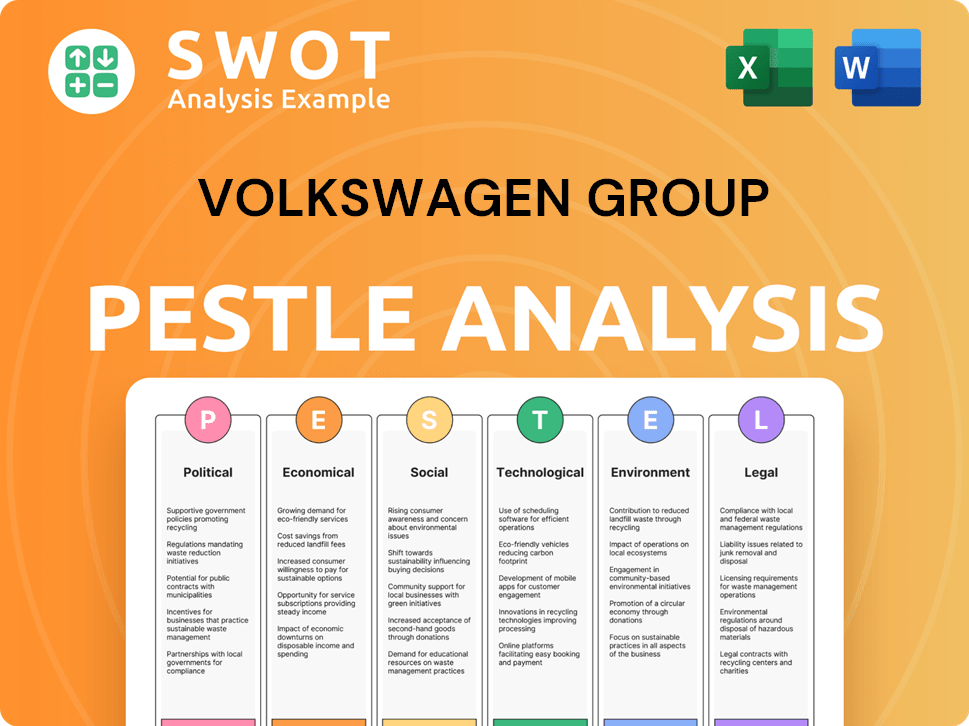
Values: What is Volkswagen Group Core Values Statement?
The Volkswagen Group's core values, known as the 'Group Essentials,' are the bedrock of its corporate culture, guiding its actions and decisions across all brands. These values define the company's identity and commitment to its stakeholders.
Responsibility at Volkswagen Group means a deep commitment to environmental and social stewardship. This includes ambitious goals like achieving net carbon neutrality by 2050, reflecting Volkswagen's commitment to Volkswagen's marketing strategy. The company is investing heavily in electric vehicle development, with a projected 70% of European sales to be electric vehicles by 2030.
Honesty is a cornerstone of Volkswagen's approach, emphasizing integrity and ethical conduct. Following the emissions scandal, the company has implemented rigorous compliance programs and is working to rebuild trust. Volkswagen aims to increase transparency in its business practices, aiming to be a more reliable and trustworthy company.
Bravery fuels Volkswagen's pursuit of innovation in the automotive industry. This includes significant investments in electric vehicles, autonomous driving technologies, and software development. The company plans to invest €180 billion in the next five years, with a significant portion allocated to future technologies.
Diversity is embraced at Volkswagen, fostering an inclusive environment where different perspectives are valued. The company is actively working to increase the representation of women in leadership positions and promote a diverse workforce. Volkswagen aims to have 30% women in management roles by 2025.
These core values shape Volkswagen's identity and guide its strategic decisions. Understanding these values provides insight into the company's commitment to sustainability, innovation, and ethical business practices. In the next chapter, we will explore how the Volkswagen mission and vision influence the company's strategic decisions.
How Mission & Vision Influence Volkswagen Group Business?
Volkswagen Group's mission and vision are not merely aspirational statements; they are the bedrock upon which its strategic decisions are built. These guiding principles profoundly influence every facet of the company, from product development to market expansion.
The "TOGETHER – Strategy 2025" and its successor, "NEW AUTO - Mobility for generations to come," launched in 2024, are direct reflections of the Volkswagen vision to become "The Global Automotive Tech Driver" and its Volkswagen mission to provide sustainable mobility. This strategic alignment ensures that all initiatives contribute to the overarching goals of the company. The company's commitment to these strategies is unwavering, even as the automotive landscape rapidly evolves.
- The "NEW AUTO" strategy, unveiled in 2024, builds upon the foundation laid by "TOGETHER 2025," emphasizing electrification, digitalization, and a customer-centric approach.
- The strategy includes ambitious targets for all-electric vehicle sales, software integration, and expansion into new markets.
- The company's focus on becoming a leading tech company by 2035 is a key component of its long-term vision.
Driven by the vision of sustainable mobility, Volkswagen Group has made significant investments in electric vehicles. The company initially pledged €35 billion for EVs by 2025, and this commitment continues to drive product development and platform innovation. This commitment is key to achieving its goals.
Volkswagen Group aims for 70% of its European sales to be electric by 2030. This ambitious target is supported by the expansion of the ID. family of electric vehicles and the development of platforms like the MEB and SSP. In 2023, all-electric vehicle deliveries rose by 34.7%, demonstrating progress towards these electrification goals. Furthermore, order intake for all-electric vehicles in Western Europe increased by 88% in FY 2024, indicating strong consumer demand and confidence in the company's electric offerings.
Recognizing software as a game-changer, the Volkswagen vision to be a tech driver has led to the creation of CARIAD, a dedicated software unit. The goal is to develop 60% of vehicle software in-house by 2025. This strategic move influences product development by integrating advanced digital features and services, enhancing the overall customer experience.
The push for electric mobility and autonomous driving has shaped market expansion and partnerships. While the partnership with Argo AI for autonomous driving technology has been re-evaluated, the strategic intent remains. The "Mobility for generations" strategy focuses on key regions like China and North America, reflecting the global ambition of the vision.
The Volkswagen mission and vision shape day-to-day operations by emphasizing integrity, responsibility, and a customer-centric approach. Long-term planning is guided by ambitious targets for electrification, software integration, and becoming a leading tech company by 2035. CEO Oliver Blume's statement in March 2025, "Our vision is geared to this: our ambition is to be the 'Global Automotive Tech Driver' by 2035," underscores the company's unwavering commitment.
Measurable success metrics, such as the increase in all-electric vehicle deliveries and order intake, demonstrate the alignment between the Volkswagen strategy and its mission and vision. These metrics provide tangible evidence of progress and guide future investments. For example, the increase in all-electric vehicle deliveries by 34.7% in 2023 and an 88% increase in order intake in Western Europe in FY2024.
The VW company values are deeply embedded in the company's strategic framework, driving innovation, sustainability, and customer satisfaction. Understanding the influence of these core principles is crucial for anyone interested in the future of the automotive industry. For more insights into the ownership and financial aspects of Volkswagen Group, explore resources like Owners & Shareholders of Volkswagen Group.
Volkswagen Group Business Model Canvas
- Complete 9-Block Business Model Canvas
- Effortlessly Communicate Your Business Strategy
- Investor-Ready BMC Format
- 100% Editable and Customizable
- Clear and Structured Layout
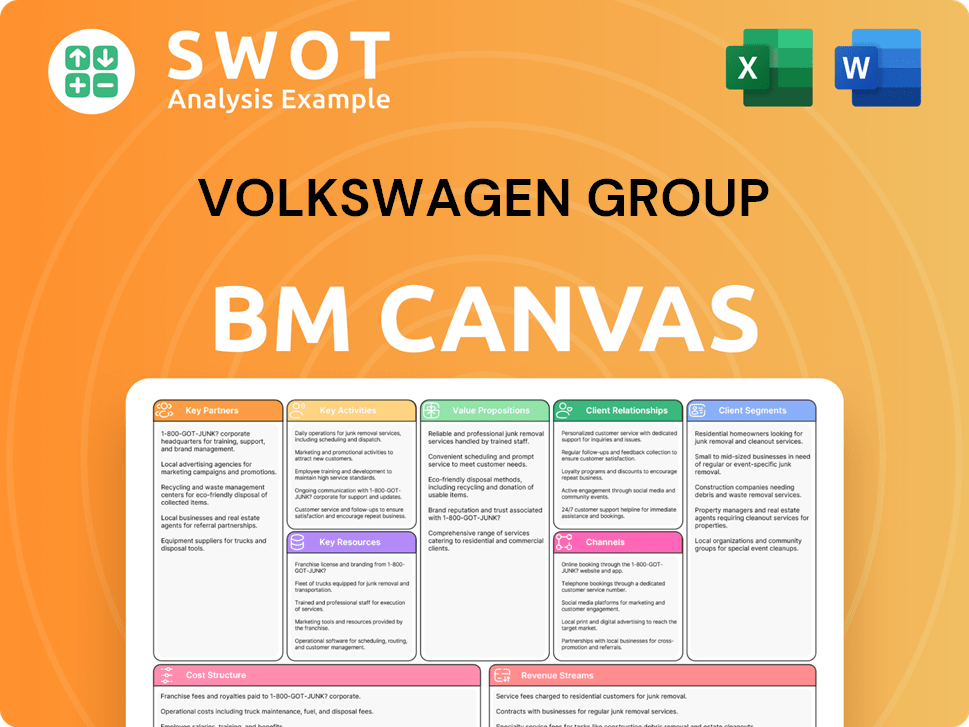
What Are Mission & Vision Improvements?
While Volkswagen Group has a solid foundation with its current mission, vision, and core values, there's always room for enhancement. These improvements can help to further solidify its position in the automotive industry and resonate more deeply with stakeholders.
One key area for improvement is streamlining the language used in the Volkswagen mission and Volkswagen vision statements. A more concise and easily digestible articulation of the Volkswagen Group's core purpose and future aspirations would improve memorability and ensure that the message is clearly understood by all, from investors to employees. For instance, consider how Tesla's mission, "To accelerate the world's transition to sustainable energy," is easily understood. As of Q1 2024, Tesla's market capitalization was approximately $580 billion, highlighting the power of a clear, concise mission.
The Volkswagen strategy could be strengthened by more explicitly integrating 'customer experience' into its core statements. While the current mission mentions 'attractive' vehicles, a more direct reference to creating seamless and innovative customer journeys would better reflect evolving consumer behaviors. This is particularly important as digital interaction becomes increasingly crucial; for example, in 2023, the global automotive software market was valued at $35.8 billion and is projected to reach $75.7 billion by 2030, highlighting the importance of a strong digital customer experience.
A refined mission or vision statement could more clearly articulate the role of software and digital services in the company's future. This better reflects the company's strategic pivot towards becoming a software-enabled car company. As of 2024, Volkswagen is investing heavily in its software division, Cariad, with plans to develop its own operating system and software stack, demonstrating the importance of this area for future growth. This is also important for understanding the Target Market of Volkswagen Group.
Adapting the statements to explicitly address the circular economy and broader sustainability concerns beyond just emissions could further align the company with evolving industry trends and regulatory landscapes. This builds upon their existing efforts in these areas. For instance, Volkswagen aims to reduce its CO2 emissions per vehicle by 30% by 2030 compared to 2018 levels, demonstrating a commitment to sustainability that could be further emphasized in its core values.
How Does Volkswagen Group Implement Corporate Strategy?
The successful implementation of a company's mission, vision, and core values is crucial for achieving its strategic goals and maintaining a strong market position. Volkswagen Group demonstrates this implementation through various strategic initiatives, programs, and transparent communication with stakeholders.
Volkswagen Group is actively implementing its mission and vision through a significant push towards electric mobility. This commitment is evident in the ambitious targets set for electric vehicle (EV) sales and the launch of new EV models.
- EV Model Launches: Launching ten new electric models by 2026.
- EV Sales Target: Aiming for a significant portion of sales to be electric by 2030.
- Affordable EVs: Introduction of affordable EVs by 2025, reflecting the mission of mobility for everyone.
- BEV Contract Growth: A 62.3% increase in BEV contracts worldwide in Q1 2025, showcasing tangible results.
Leadership plays a critical role in reinforcing the Volkswagen mission, Volkswagen vision, and Volkswagen core values throughout the organization. CEO Oliver Blume’s emphasis on sustainability as a core value guides responsible actions and strategic direction.
Volkswagen Group communicates its strategic direction and progress to stakeholders through various channels, ensuring transparency and alignment between stated values and business practices. This includes formal reports and presentations.
The company utilizes formal programs and systems to operationalize its Volkswagen strategy and integrate its mission and vision into daily operations. These frameworks provide structure for implementing key initiatives.
Concrete examples demonstrate the alignment between stated values and actual business practices. This includes employee recognition and the integration of sustainability into operations.
- Top Employer Certification: Certification as a Top Employer for 2025 in North America, highlighting commitment to employee values.
- Sustainability Strategy: The 'regenerate+' sustainability strategy with clear measures in areas like nature, people, and business.
- 'TOGETHER – Strategy 2025': Provides a framework for implementing the mission and vision.
For a deeper understanding of the foundational principles, explore the Mission, Vision & Core Values of Volkswagen Group.
Volkswagen Group Porter's Five Forces Analysis
- Covers All 5 Competitive Forces in Detail
- Structured for Consultants, Students, and Founders
- 100% Editable in Microsoft Word & Excel
- Instant Digital Download – Use Immediately
- Compatible with Mac & PC – Fully Unlocked
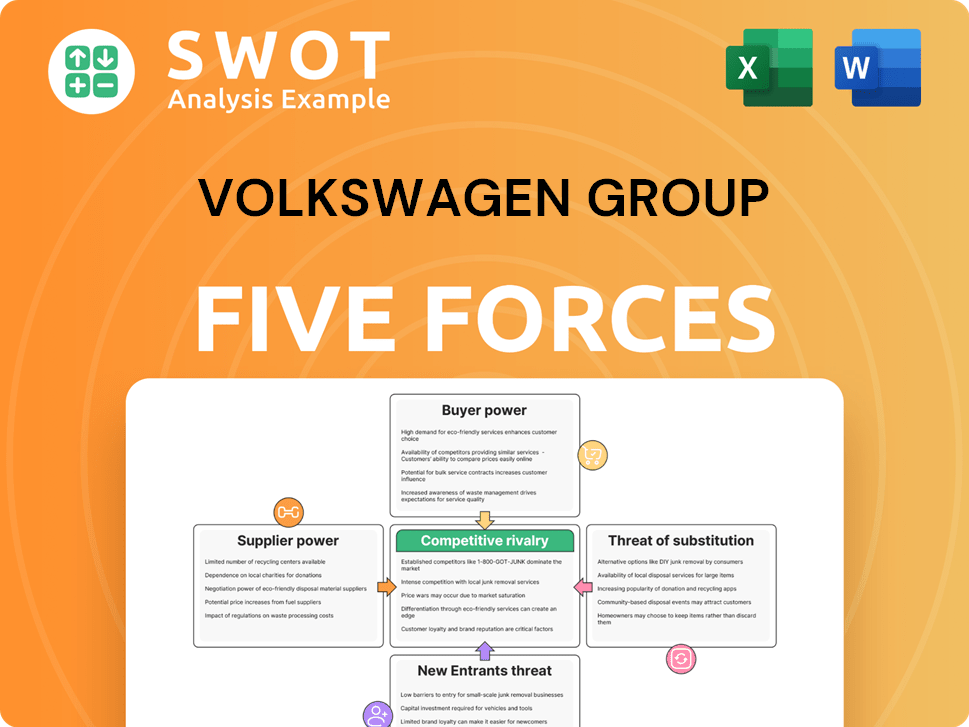
Related Blogs
- What are Mission Vision & Core Values of Volkswagen Group Company?
- What is Competitive Landscape of Volkswagen Group Company?
- What is Growth Strategy and Future Prospects of Volkswagen Group Company?
- How Does Volkswagen Group Company Work?
- What is Sales and Marketing Strategy of Volkswagen Group Company?
- Who Owns Volkswagen Group Company?
- What is Customer Demographics and Target Market of Volkswagen Group Company?
Disclaimer
All information, articles, and product details provided on this website are for general informational and educational purposes only. We do not claim any ownership over, nor do we intend to infringe upon, any trademarks, copyrights, logos, brand names, or other intellectual property mentioned or depicted on this site. Such intellectual property remains the property of its respective owners, and any references here are made solely for identification or informational purposes, without implying any affiliation, endorsement, or partnership.
We make no representations or warranties, express or implied, regarding the accuracy, completeness, or suitability of any content or products presented. Nothing on this website should be construed as legal, tax, investment, financial, medical, or other professional advice. In addition, no part of this site—including articles or product references—constitutes a solicitation, recommendation, endorsement, advertisement, or offer to buy or sell any securities, franchises, or other financial instruments, particularly in jurisdictions where such activity would be unlawful.
All content is of a general nature and may not address the specific circumstances of any individual or entity. It is not a substitute for professional advice or services. Any actions you take based on the information provided here are strictly at your own risk. You accept full responsibility for any decisions or outcomes arising from your use of this website and agree to release us from any liability in connection with your use of, or reliance upon, the content or products found herein.